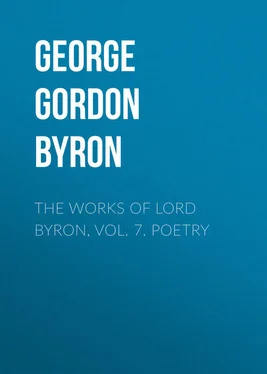George Gordon Byron - The Works of Lord Byron, Vol. 7. Poetry
Здесь есть возможность читать онлайн «George Gordon Byron - The Works of Lord Byron, Vol. 7. Poetry» — ознакомительный отрывок электронной книги совершенно бесплатно, а после прочтения отрывка купить полную версию. В некоторых случаях можно слушать аудио, скачать через торрент в формате fb2 и присутствует краткое содержание. ISBN: , Жанр: foreign_antique, foreign_prose, foreign_poetry, на английском языке. Описание произведения, (предисловие) а так же отзывы посетителей доступны на портале библиотеки ЛибКат.
- Название:The Works of Lord Byron, Vol. 7. Poetry
- Автор:
- Жанр:
- Год:неизвестен
- ISBN:http://www.gutenberg.org/ebooks/27577
- Рейтинг книги:5 / 5. Голосов: 1
-
Избранное:Добавить в избранное
- Отзывы:
-
Ваша оценка:
- 100
- 1
- 2
- 3
- 4
- 5
The Works of Lord Byron, Vol. 7. Poetry: краткое содержание, описание и аннотация
Предлагаем к чтению аннотацию, описание, краткое содержание или предисловие (зависит от того, что написал сам автор книги «The Works of Lord Byron, Vol. 7. Poetry»). Если вы не нашли необходимую информацию о книге — напишите в комментариях, мы постараемся отыскать её.
The Works of Lord Byron, Vol. 7. Poetry — читать онлайн ознакомительный отрывок
Ниже представлен текст книги, разбитый по страницам. Система сохранения места последней прочитанной страницы, позволяет с удобством читать онлайн бесплатно книгу «The Works of Lord Byron, Vol. 7. Poetry», без необходимости каждый раз заново искать на чём Вы остановились. Поставьте закладку, и сможете в любой момент перейти на страницу, на которой закончили чтение.
Интервал:
Закладка:
I have elsewhere acknowledged the valuable information with regard to certain rare editions and pamphlets which I have received from Mr. H. Buxton Forman, C.B.
My especial thanks for laborious researches undertaken on my behalf, and for information not otherwise attainable, are due to M. J. E. Aynard, of Lyons; Signor F. Bianco; Professor Max von Förster, of Wurtzburg; Professor Lajos Gurnesovitz, of Buda Pest; Dr. Holzhausen, of Bonn; Mr. Leonard Mackall, of Berlin; Miss Peacock; Miss K. Schlesinger; M. Voynich, of Soho Square; Mr. Theodore Bartholomew, of the University Library of Cambridge; Mr. T. D. Stewart, of the Croydon Public Library; and the Librarians of Trinity College, Cambridge, and University College, St. Andrews.
I have also to thank, for special and generous assistance, Mr. J. P. Anderson, late of the British Museum, the author of the "Bibliography of Byron's Works" attached to the Life of Lord Byron by the Hon. Roden Noel (1890); Miss Grace Reed, of Philadelphia, for bibliographical entries of early American editions; and Professor Vladimir Hrabar, of the University of Dorpat, for the collection and transcription of numerous Russian translations of Byron's Works.
To Messrs. Clowes, the printers of these volumes, and to their reader, Mr. F. T. Peachey, I am greatly indebted for the transcription of Slavonic titles included in the Summary of the Bibliography, and for interesting and useful information during the progress of the work.
In conclusion, I must once more express my acknowment of the industry and literary ability of my friend Mr. F. E. Taylor, of Chertsey, who has read the proofs of this and the six preceding volumes.
The Index is the work of Mr. C. Eastlake Smith.
November , 1903.
JEUX D'ESPRIT AND MINOR POEMS, 1798-1824
EPIGRAM ON AN OLD LADY WHO HAD SOME CURIOUS NOTIONS RESPECTING THE SOUL
In Nottingham county there lives at Swan Green, 1 1 "Swan Green" should be "Swine Green." It lay about a quarter of a mile to the east of St. James's Lane, where Byron lodged in 1799, at the house of a Mr. Gill. The name appears in a directory of 1799, but by 1815 it had been expunged or changed euphoniæ gratiâ . (See A New Plan of the Town of Nottingham , … 1744.) Moore took down "these rhymes" from the lips of Byron's nurse, May Gray, who regarded them as a first essay in the direction of poetry. He questioned their originality.
As curst an old Lady as ever was seen;
And when she does die, which I hope will be soon,
She firmly believes she will go to the Moon!
EPITAPH ON JOHN ADAMS, OF SOUTHWELL, A CARRIER, WHO DIED OF DRUNKENNESS
John Adams lies here, of the parish of Southwell,
A Carrier who carried his can to his mouth well;
He carried so much and he carried so fast,
He could carry no more – so was carried at last;
For the liquor he drank being too much for one,
He could not carry off; – so he's now carri-on .
A VERSION OF OSSIAN'S ADDRESS TO THE SUN. FROM THE POEM "CARTHON."
O thou! who rollest in yon azure field,
Round as the orb of my forefather's shield,
Whence are thy beams? From what eternal store
Dost thou, O Sun! thy vast effulgence pour?
In awful grandeur, when thou movest on high,
The stars start back and hide them in the sky;
The pale Moon sickens in thy brightening blaze,
And in the western wave avoids thy gaze.
Alone thou shinest forth – for who can rise
Companion of thy splendour in the skies!
The mountain oaks are seen to fall away —
Mountains themselves by length of years decay —
With ebbs and flows is the rough Ocean tost;
In heaven the Moon is for a season lost,
But thou, amidst the fullness of thy joy,
The same art ever, blazing in the sky!
When tempests wrap the world from pole to pole,
When vivid lightnings flash and thunders roll,
Thou far above their utmost fury borne,
Look'st forth in beauty, laughing them to scorn.
But vainly now on me thy beauties blaze —
Ossian no longer can enraptured gaze!
Whether at morn, in lucid lustre gay,
On eastern clouds thy yellow tresses play,
Or else at eve, in radiant glory drest,
Thou tremblest at the portals of the west,
I see no more! But thou mayest fail at length,
Like Ossian lose thy beauty and thy strength,
Like him – but for a season – in thy sphere
To shine with splendour, then to disappear!
Thy years shall have an end, and thou no more
Bright through the world enlivening radiance pour,
But sleep within thy clouds, and fail to rise,
Heedless when Morning calls thee to the skies!
Then now exult, O Sun! and gaily shine,
While Youth and Strength and Beauty all are thine.
For Age is dark, unlovely, as the light
Shed by the Moon when clouds deform the night,
Glimmering uncertain as they hurry past.
Loud o'er the plain is heard the northern blast,
Mists shroud the hills, and 'neath the growing gloom,
The weary traveller shrinks and sighs for home.
2 2 [I am indebted to the courtesy of Mr. Pierre De La Rose for sending me a copy of the foregoing Version of Ossian's Address to the Sun , which was "Privately printed at the Press of Oliver B. Graves, Cambridge, Massachusetts, June the Tenth, MDCCCXCVIII.," and was reprinted in the Atlantic Monthly in December, 1898. A prefatory note entitled, "From Lord Byron's Notes," is prefixed to the Version: "In Lord Byron's copy of The Poems of Ossian (printed by Dewick and Clarke, London, 1806), which, since 1874, has been in the possession of the Library of Harvard University as part of the Sumner Bequest. The notes which follow appear in Byron's hand." (For the Notes , see the Atlantic Monthly , 1898, vol. lxxxii. pp. 810-814.) It is strange that Byron should have made two versions (for another "version" from the Newstead MSS., see Poetical Works , 1898, i. 229-231) of the "Address to the Sun," which forms the conclusion of "Carthon;" but the Harvard version appears to be genuine. It is to be noted that Byron appended to the earlier version eighteen lines of his own composition, by way of moral or application.]]
LINES TO MR. HODGSON.
WRITTEN ON BOARD THE LISBON PACKET
Huzza! Hodgson 3 3 [For Francis Hodgson (1781-1852), see Letters , 1898, i. 195, note 1.]
, we are going,
Our embargo's off at last;
Favourable breezes blowing
Bend the canvas o'er the mast.
From aloft the signal's streaming,
Hark! the farewell gun is fired;
Women screeching, tars blaspheming,
Tell us that our time's expired.
Here's a rascal
Come to task all,
Prying from the Custom-house;
Trunks unpacking
Cases cracking,
Not a corner for a mouse
Scapes unsearched amid the racket,
Ere we sail on board the Packet.
Now our boatmen quit their mooring,
And all hands must ply the oar;
Baggage from the quay is lowering,
We're impatient, push from shore.
"Have a care! that case holds liquor —
Stop the boat – I'm sick – oh Lord!"
"Sick, Ma'am, damme, you'll be sicker,
Ere you've been an hour on board."
Thus are screaming
Men and women,
Gemmen, ladies, servants, Jacks;
Here entangling,
All are wrangling,
Stuck together close as wax. —
Such the general noise and racket,
Ere we reach the Lisbon Packet.
Интервал:
Закладка:
Похожие книги на «The Works of Lord Byron, Vol. 7. Poetry»
Представляем Вашему вниманию похожие книги на «The Works of Lord Byron, Vol. 7. Poetry» списком для выбора. Мы отобрали схожую по названию и смыслу литературу в надежде предоставить читателям больше вариантов отыскать новые, интересные, ещё непрочитанные произведения.
Обсуждение, отзывы о книге «The Works of Lord Byron, Vol. 7. Poetry» и просто собственные мнения читателей. Оставьте ваши комментарии, напишите, что Вы думаете о произведении, его смысле или главных героях. Укажите что конкретно понравилось, а что нет, и почему Вы так считаете.












